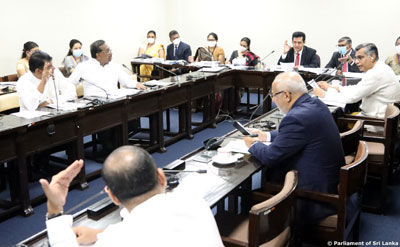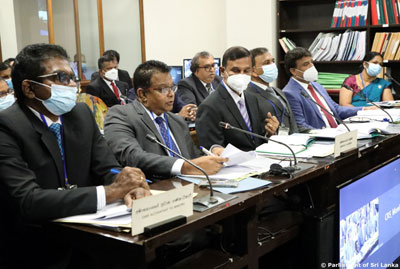News
High-cost medical supplies network under Auditor General’s microscope
View(s):- Three institutions submit conflicting figures to COPE as to its cost
- Handicapped system falls short of expectations, allege officials
- EWIS defends its product; questions Health Ministry’s claim on the cost

COPE members grilling officials of the State Pharmaceutical Corporation (SPC) and the Health Ministry’s Medical Supplies Division (MSD) on May 31
By Sandun Jayawardana
With three different institutions submitting conflicting sets of figures with regard to an allegedly faulty medical supplies system costing hundreds of millions of rupees in taxpayer funds, the Committee on Public Enterprises (COPE) has directed the Auditor General to conduct a special audit on the project and submit a report within a month.
Many questions remain over the Medical Supplies Management Information System (MSMIS) — an inventory management system that took seven years to build and implement, but which had allegedly been plagued by problems since it was implemented in 2015.
When officials from the State Pharmaceutical Corporation (SPC) and the Health Ministry’s Medical Supplies Division (MSD) were summoned before COPE on May 31, it was claimed that the system was set up at a cost of Rs. 644 million, while Rs. 5 million has been paid to the supplier on a monthly basis as maintenance costs — or Rs. 60 million annually.
Both COPE Chairman Prof. Charitha Herath and member Dr Harsha de Silva decried the colossal expenditure on a system that did not work properly as “a crime.” 
In the aftermath of the COPE revelations, however, the supplier EWIS hit back, holding a media conference on June 3 to respond to the “false” allegations made during the COPE session. The company also wrote directly to COPE Chair Prof. Herath giving its side of the story and submitting a radically different set of figures regarding how much the project had cost and what it had been paid.
According to EWIS, the total cost of the project was just more than Rs. 223 million. Of this, Rs. 53 million was for the MSMIS software while the rest of the cost was for hardware, network, data centre and data communication links. Monthly recurrent costs from October 2020 totalled Rs. 4.9 million. This was for software, hardware and data communication links for 83 locations island-wide, the company said.
Also submitting a different set of figures was the State Ministry of Health. It informed COPE in writing that EWIS Information Systems was paid Rs. 458 million while its subsidiary EWIS Solutions (Pvt) Ltd. was paid Rs. 66 million for the project. Accordingly, nearly Rs. 525 million had been paid directly to the company so far, it claimed.
COPE Chairman Herath tabled these reports on Tuesday, June 7. Given the conflicting figures presented by three different parties, he directed the Auditor General to conduct a special audit on the project within a month.
He told the Sunday Times the Committee would present a complete report on this matter after the Auditor General’s observations.
EWIS was awarded the contract to build the MSMIS in 2008 by the MSD. The aim of the project was to link hospitals throughout the country to keep a digital inventory of medicinal drugs and a record of drug consumption so that shortages could be identified and attended to, said Dr. R.M.S.K. Rathnayake, former Secretary to the Ministry of Production, Supply and Regulation of Pharmaceuticals.
But the system failed to give real-time data and had to be updated manually, he noted.
Someone had to manually enter what drugs had been issued from which hospital on a given day. This was problematic given that drugs were issued from several places in some hospitals including wards, outpatient departments and clinics. MSMIS was also supposed to help the SPC to estimate required medicine stocks for the coming year and make purchase orders but this too had run into problems due to deficiencies in the system.
“The system does not offer real-time data and is outdated,” Dr Rathnayake said. Some 237 hospitals have been connected to the system so far though there are 1159 state hospitals in the country. Each institution must also purchase a user licence when obtaining the software.
“The plan is to expand the system to cover individual wards. That requires all of them to be connected to the system. Some hospitals will have to buy several licences. As such, expanding the system would require an estimated Rs. 7 billion over three years.” The Rs. 7 billion figure was given by the Colombo University’s School of Computing (UCSC) following an assessment.
In an emailed statement, EWIS rejected allegations that its system is not working. It noted that from 2015 till May 31 this year, the SPC had raised 45,458 purchase orders using the MSMIS system. More than 928 purchase orders had been raised by SPC using this system in 2022 alone. “The fact that in December 2018 the Ministry of Health added 68 additional Hospitals to the MSMIS system, and another 62 hospitals in December 2019, further reiterates our point,” the company argued.
The responses given by the officials during the COPE hearing “are completely inaccurate, false, and defamatory to our organisation,” the statement claimed.
Nevertheless, officials had previously brought up issues related to the system in closed-door meetings. The Sunday Times has seen minutes of a meeting held on September 8 last year to discuss issues in the MSMIS system and MSMIS expansion project. It was chaired by Prof. Channa Jayasumana, the then State Minister of Production, Supply and Regulation of Pharmaceuticals.
Issues raised at the meeting included difficulties in supply estimation, the use of outdated technology and the lack of a notification system for users. It had also been stated that MSMIS is not a cost-effective system due to user licencing for each institution for concurrence users, creating considerable overhead cost.
A separate list of recommendations compiled by UCSC to resolve the system’s technical issues includes complete reengineering of the existing system, improving its user-friendliness, reconsideration of costing and maintenance components and obtaining the complete source code (list of commands) for the Health Ministry to take full ownership of the entire MSIMS system. UCSC had noted that it was “advisable to replace the entire application and move to a modern solution that addresses all aforementioned issues.”
A different local company was awarded the contract earlier this year to expand the MSMIS. It had quoted Rs. 73 million for the software and Rs. 101 million over three years as maintenance costs, according to Dr. Rathnayake. EWIS also bid for the expansion project but was not selected.
The MSMIS expansion plan will see data being automatically updated in real-time onto a dashboard, making it possible, among other things, to immediately know the availability of a particular drug at a hospital, Dr. Rathnayake stated.
Meanwhile, the Government has already decided not to renew the MSMIS agreement signed with EWIS that is set to expire in October this year.
The best way to say that you found the home of your dreams is by finding it on Hitad.lk. We have listings for apartments for sale or rent in Sri Lanka, no matter what locale you're looking for! Whether you live in Colombo, Galle, Kandy, Matara, Jaffna and more - we've got them all!

